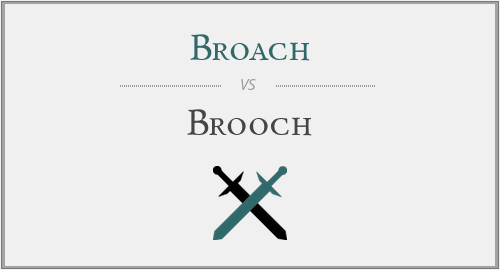She sat on the couch, handed me a pearl brooch and broached the sensitive subject of her declining health.
Broach and broach are two words that have same pronunciation and almost similar spellings (with a difference of a single letter), but their meaning and usage is very different. This causes a lot of confusion in the writers and bloggers all over the world when they sometimes fail to differentiate between them and use one brooch when they meant to use the other.
Does the above sentence give you a fair idea of what brooch and broach mean? Worry not! We are here to help. This article will eliminate your misunderstandings about the two words and help you learn their meanings and differences through the use of examples.
Origin:
Broach originated from Old French brochier, based on Latin brocchus, broccus ‘projecting’. The earliest recorded sense was ‘prick with spurs’, generally ‘pierce’, which gave rise (late Middle English) to sense 2. Sense 1, a figurative use of this, dates from the late 16th century.
Broach as verb:
Broach is used in English language as a verb that means to raise a difficult subject for discussion. With synonyms like bring up, raise, introduce, talk about, mention, touch on, open, embark on or enter on etc. here is an example: He broached the subject he had been avoiding all evening. Another way of using broach as a verb is when it means to pierce (a cask) to draw out liquid. With synonyms like pierce, tap and puncture, here is as example: He watched a pot boy broach a new cask. The similar meaning of broach is to open and start using the contents of a bottle or other container.
Boxed wines will remain in good condition for up to four months once broached.
Broach is also utilized when a fish or some other sea animal rise through the water and break the surface.
The salmon broach, then fall to slap the water.
Brooch as noun:

Brooch (with a double o) is used as a noun in English language where it has one singular meaning. The noun broach means an ornament fastened to clothing with a hinged pin and catch. The brooch serves the purpose of decoration, attraction and sometimes keeping the clothes in place.
My grandma gave me a family brooch on my wedding.
Examples:
She wanted to reach out to friends, but it never felt like the right time to broach the subject. [Washington Post]
For fall, the standout was a little piece of Surrealism for your lapel: a “painted eye” brooch. [Los Angeles Times]
Many companies are reluctant to alarm employees – or broach the sensitive issue of only recalling expats. [Financial Times]
My reward was a small enamel brooch of the Disney figure: purple floppy hat, green coat and droopy trousers that pooled around his feet. [The Australian]
Broach or brooch:
David Rothwell beautifully described the difference between the two words in his book Dictionary of Homonyms (2007) as, “If you broach something, you are suggesting that it is a valid topic for possible further discussion. If you wear a brooch on your dress, you hope that it will attract attention because of its beauty, and therefore, of course, attract attention to you who are wearing the brooch."








Have a discussion about this article with the community:
Report Comment
We're doing our best to make sure our content is useful, accurate and safe.
If by any chance you spot an inappropriate comment while navigating through our website please use this form to let us know, and we'll take care of it shortly.
Attachment
You need to be logged in to favorite.
Log In